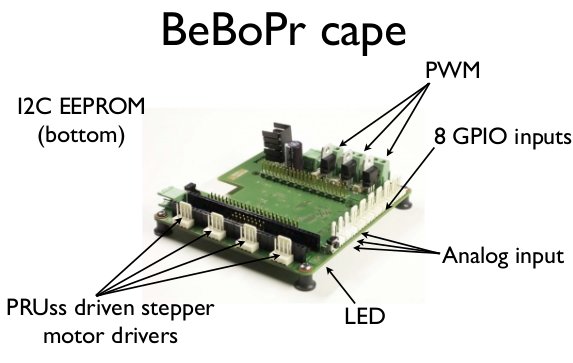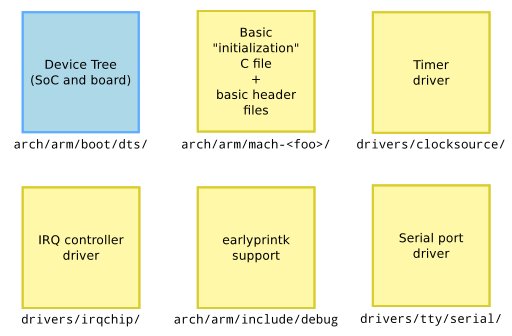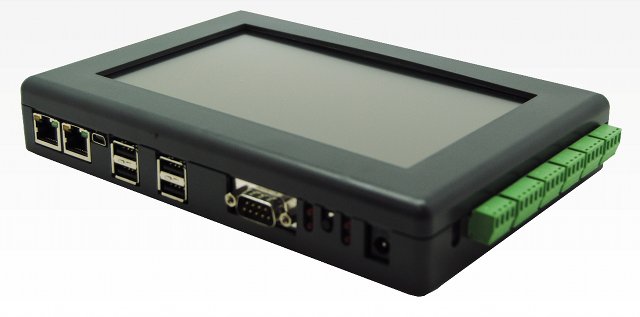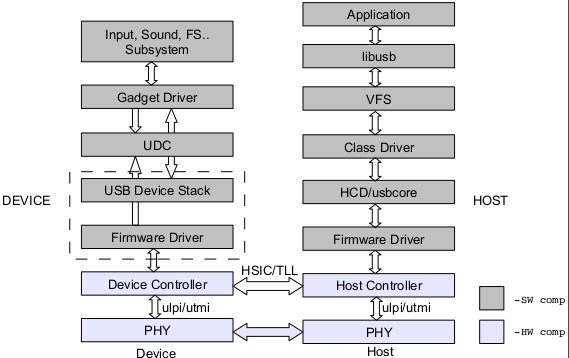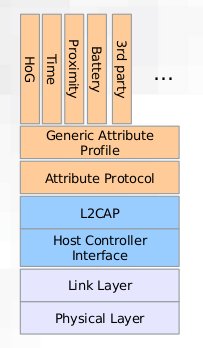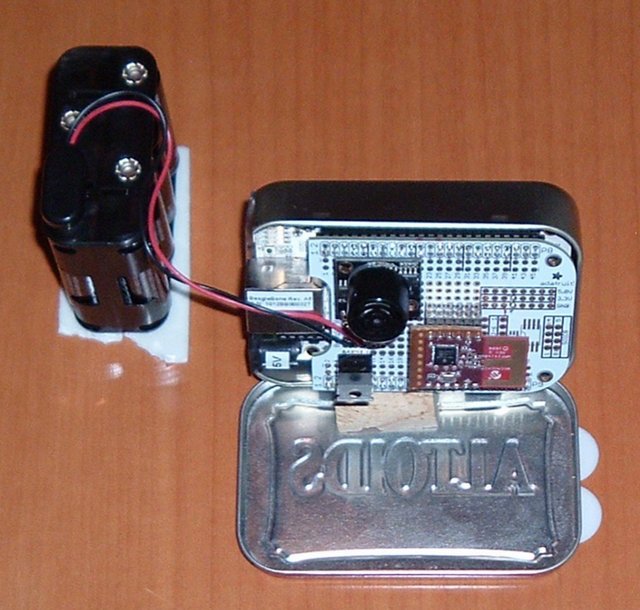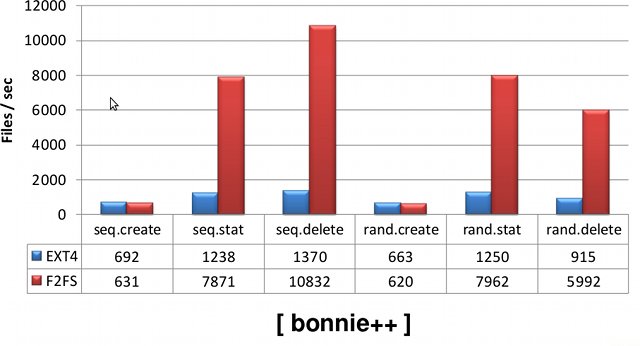Koen Kooi, software engineering manager at Circuitco Electronics and lead developer of the Angstrom distribution, explains that device tree does help with the ARM Linux kernel, but brings all the complexity to the bootloader(s), taking the variety of Beaglebone capes as example, at the Embedded Linux Conference in Barcelona, Spain, on November 6, 2012. Abstract: Devicetree is marketed as the one ring to rule them all when it comes to non-discoverable hardware for Linux on ARM. The problem with devicetree is that the complexity gets removed from the kernel and put into the bootloader. Koen first gives an overview of device tree, and provides an example (am33xx.dtsi) to show device tree data structure. Then time for some Beaglebone and capes promotion overview, before moving to the core of the problem: Pinctrl Resource tracking EVM/bone split uboot/uimage/dtb lockstep pdata only Keycodes and other non-hardware bits You can also download the presentation […]
Your New ARM SoC Linux Support Check-List – ELCE 2012
Thomas Petazzoni, embedded Linux engineer and trainer at Free Electrons, describes the steps he followed to add a new Marvell SoC to the mainline kernel at ELCE 2012. Abstract: Since Linus Torvalds raised warnings about the state of the ARM architecture support in the Linux kernel, a huge amount of effort and reorganization has happened in the way Linux supports ARM SoCs. From the addition of the device tree to the pinctrl subsystem, from the new clock framework to the new rules in code organization and design, the changes have been significant over the last one and half year in the Arm Linux kernel world. Based on the speaker’s experience on getting the support for the new Marvell Armada 370 and Armada XP SoC support in the mainline Linux kernel, we will give an overview of those changes and summarize the new rules for ARM Linux support. We aim at […]
Porting Android 4.0 to a Custom Industrial Board Based on TI OMAP 3 – ELCE 2012
Matthias Brugger, embedded engineer at ISEE, describes the steps the company had to follow (referred to as a “war story”) to port Android 4.0 to a custom industrial board at ELCE 2012, Barcelona, on November 5, 2012. Abstract: This talk will explain the lessons learned by giving a step-by-step introduction of porting Android to a custom board which was designed for an industrial environment. This includes an introduction to the Android build environment, first board bring-up and peripheral integration. The talk will cover bootloader integration, power management. It will focus on the peculiarities configuring Ethernet and Wi-Fi in Android. Also button and display integration, as well as integration of third-party accelerator support will be explained. Android devices are getting popular not only in the mobile market but although in the industrial environment. Porting Android to a custom board can be challenging, especially as little information about Android internals are available. […]
USB Debugging and Profiling Techniques – ELCE 2012
Kishon Vijay Abraham and Basak Partha, respectively software design engineer and tech lead at Texas Instruments, provide an overview of techniques that can be used to debug Linux USB drivers on the host PC or/and the device itself. Abstract: The widespread integration of USB into embedded applications presents many developers with the challenge of debugging problems, that are difficult to detect and isolate when a USB device misbehaves. This paper discusses about the various USB debugging techniques which includes debugging at the host PC, at the device and in the cable and discuss when each of the above techniques will be handy. This paper will also discuss about the various facilities provided within Linux kernel to aid in USB debugging e.g sysfs, trace points etc. and the various user space tools available to help USB debugging e.g USBMON. This paper also discusses about the profiling techniques at various levels in […]
Bluetooth Smart Devices and Low Energy support on Linux – ELCE 2012
Andre Guedes and João Paulo Rechi Vita, software engineers at Instituto Nokia de Tecnologia (INdT), give a presentation about Bluetooth Low Energy support on Linux (BlueZ stack) at the Embedded Linux Conference Europe in Barcelona on November 5, 2012. Abstract: This presentation will cover a brief introduction on how the Bluetooth Low Energy technology works. Then it will present the current status of its support on Linux, presenting the available APIs and how to interact with Bluetooth Smart devices. Then we’ll present the profiles we’re currently working on and what support can be expected to be found on Linux and BlueZ this year. There will be also a few demos of Bluetooth Smart devices working on Linux. The audience of this talk is application or framework developers that want to add support for Bluetooth Smart devices to their software, hardware vendors,and technology curious. Basic Bluetooth understanding is recommended but not […]
Device Tree and its Stumbling Blocks – ELCE 2012
Wolfram Sang, kernel developer for embedded systems at Pengutronix, talks about Device trees and conflicts and pitfalls he experienced as a kernel developer and I2C subsystem maintainer. This is one of several talks about Device trees at ELCE 2012. Abstract: Since ARM started to use device trees, their impact on various subsystems in the kernel has been increasing significantly. Because they became the de-facto standard, everybody wants them soon. Because they need a ton of conversions and adaptions, a lot of questions are still unresolved. This carries potential for conflicts.Wolfram has dealt with device trees already on PowerPC and still does on ARM. Additionally, he co-maintains the I2C subsystem which is affected by device tree conversions, too. Knowing both sides, as developer and as maintainer, he will talk about stumbling blocks experienced so far, e.g. typical pitfalls when inventing bindings or the high pace. A number of examples will be […]
Wireless Networking with IEEE 802.15.4 and 6LoWPAN – ELCE 2012
Alan Ott, founder of Signal 11 Software, gives a presentation dealing with wireless networking for the internet of things in Linux, especially with 802.15.4 and 6LoWPAN standards at the Embedded Linux Conference in Barcelona, Spain on November 5, 2012. Abstract: With the rise of the internet of things, low-power wireless devices will become increasingly prevalent. IEEE 802.15.4 is a wireless networking protocol designed for low-power and low-data-rate devices, such as those used in wireless sensor networks. While some higher layer protocols based on 802.15.4 are proprietary, an open standard called 6LoWPAN enables IPv6 traffic over 802.15.4. This presentation will give overviews of 802.15.4, its status in the Linux kernel, hardware support, comparison with other wireless protocols, and a demonstration of a simple 802.15.4/6loWPAN network. This presentation is targeted toward developers who wish to create low-power, low-data-rate wireless networks for sensors or other applications. Attendees can expect to gain a basic […]
F2FS – A New Flash File System for Mobile Devices – ELCE 2012
Joo-Young Hwang, principal engineer at Samsung, presents F2FS (Flash-Friendly File System), a new file system designed for storage in mobile devices at the Embedded Linux Conference in Barcelona, Spain, on November 5, 2012. Abstract: Recent mobile devices adopt various flash storages as a primary storage. File system support for those flash storages is a must for flash device performance and lifespan. I will present a new file system, called F2FS, designed for mobile flash storages. F2FS is designed considering the characteristics of the underlying flash storage which has flash translation layer (FTL). F2FS outperforms EXT4, which is a popular file system for Android phones, in most of benchmarks. I will describe motivation, design, and implementation of the file system, then show performance comparison data with EXT4. Target audiences are those who are interested in file system support for flash storages such as eMMC and SSD. Kernel and file system expertise […]


